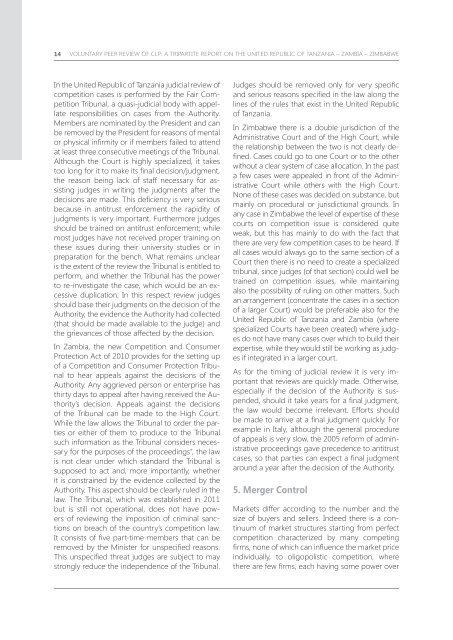a tripartite report - Unctad
a tripartite report - Unctad
a tripartite report - Unctad
Create successful ePaper yourself
Turn your PDF publications into a flip-book with our unique Google optimized e-Paper software.
14 VOLUNTARY PEER REVIEW OF CLP: A TRIPARTITE REPORT ON THE UNITED REPUBLIC OF TANZANIA – ZAMBIA – ZIMBABWE<br />
In the United Republic of Tanzania judicial review of<br />
competition cases is performed by the Fair Competition<br />
Tribunal, a quasi-judicial body with appellate<br />
responsibilities on cases from the Authority.<br />
Members are nominated by the President and can<br />
be removed by the President for reasons of mental<br />
<br />
at least three consecutive meetings of the Tribunal.<br />
Although the Court is highly specialized, it takes<br />
<br />
the reason being lack of staff necessary for assisting<br />
judges in writing the judgments after the<br />
<br />
because in antitrust enforcement the rapidity of<br />
judgments is very important. Furthermore judges<br />
should be trained on antitrust enforcement; while<br />
most judges have not received proper training on<br />
these issues during their university studies or in<br />
preparation for the bench. What remains unclear<br />
is the extent of the review the Tribunal is entitled to<br />
perform, and whether the Tribunal has the power<br />
to re-investigate the case, which would be an excessive<br />
duplication. In this respect review judges<br />
should base their judgments on the decision of the<br />
Authority, the evidence the Authority had collected<br />
(that should be made available to the judge) and<br />
the grievances of those affected by the decision.<br />
In Zambia, the new Competition and Consumer<br />
Protection Act of 2010 provides for the setting up<br />
of a Competition and Consumer Protection Tribunal<br />
to hear appeals against the decisions of the<br />
Authority. Any aggrieved person or enterprise has<br />
thirty days to appeal after having received the Authority’s<br />
decision. Appeals against the decisions<br />
of the Tribunal can be made to the High Court.<br />
While the law allows the Tribunal to order the parties<br />
or either of them to produce to the Tribunal<br />
such information as the Tribunal considers necessary<br />
for the purposes of the proceedings”, the law<br />
is not clear under which standard the Tribunal is<br />
supposed to act and, more importantly, whether<br />
it is constrained by the evidence collected by the<br />
Authority. This aspect should be clearly ruled in the<br />
law. The Tribunal, which was established in 2011<br />
but is still not operational, does not have powers<br />
of reviewing the imposition of criminal sanctions<br />
on breach of the country’s competition law.<br />
<br />
<br />
<br />
strongly reduce the independence of the Tribunal.<br />
<br />
<br />
lines of the rules that exist in the United Republic<br />
of Tanzania.<br />
In Zimbabwe there is a double jurisdiction of the<br />
Administrative Court and of the High Court, while<br />
the relationship between the two is not clearly de-<br />
<br />
without a clear system of case allocation. In the past<br />
a few cases were appealed in front of the Administrative<br />
Court while others with the High Court.<br />
None of these cases was decided on substance, but<br />
mainly on procedural or jurisdictional grounds. In<br />
any case in Zimbabwe the level of expertise of these<br />
courts on competition issue is considered quite<br />
weak, but this has mainly to do with the fact that<br />
there are very few competition cases to be heard. If<br />
all cases would always go to the same section of a<br />
Court then there is no need to create a specialized<br />
tribunal, since judges (of that section) could well be<br />
trained on competition issues, while maintaining<br />
also the possibility of ruling on other matters. Such<br />
an arrangement (concentrate the cases in a section<br />
of a larger Court) would be preferable also for the<br />
United Republic of Tanzania and Zambia (where<br />
specialized Courts have been created) where judges<br />
do not have many cases over which to build their<br />
expertise, while they would still be working as judges<br />
if integrated in a larger court.<br />
As for the timing of judicial review it is very important<br />
that reviews are quickly made. Otherwise,<br />
especially if the decision of the Authority is sus-<br />
<br />
the law would become irrelevant. Efforts should<br />
<br />
example in Italy, although the general procedure<br />
of appeals is very slow, the 2005 reform of administrative<br />
proceedings gave precedence to antitrust<br />
<br />
around a year after the decision of the Authority.<br />
5. Merger Control<br />
Markets differ according to the number and the<br />
size of buyers and sellers. Indeed there is a continuum<br />
of market structures starting from perfect<br />
competition characterized by many competing<br />
<br />
individually, to oligopolistic competition, where

















